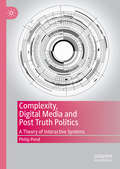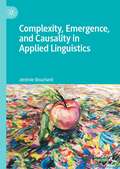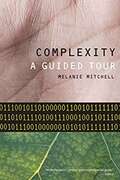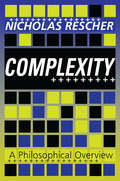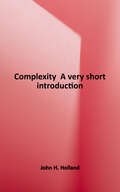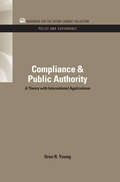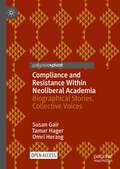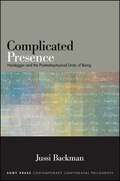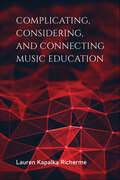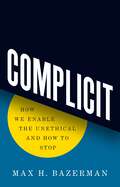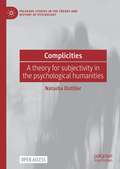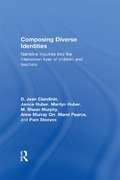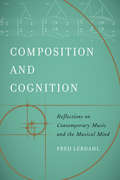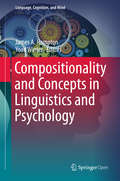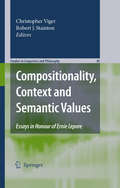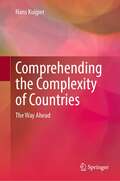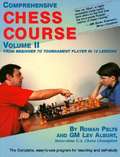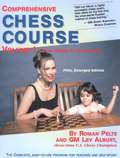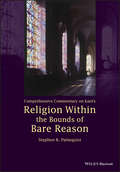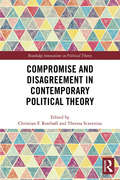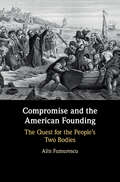- Table View
- List View
Complexity, Digital Media and Post Truth Politics: A Theory of Interactive Systems
by Philip PondThis book analyses the relationship between digital media systems and post truth politics. It demonstrates that the complexity of modern systems is an existential challenge for our ability to understand and research these issues. A new theory is proposed for studying complexity, explaining how system interactionism differs from established ideas, including assemblage and actor network theories. After considering the social system of Niklas Luhmann, the author proposes an interactionist methodology better equipped to deal with system complexity. A description of the logical operations of the digital and political systems is provided, establishing precedents for an analysis of the role of hypertext in shaping the emergent digital-politics. The book demonstrates how the principles of system interactionism can guide digital media research into polarisation and political language.
Complexity, Emergence, and Causality in Applied Linguistics
by Jérémie BouchardThis book suggests that applied linguistics research is inherently concerned with complexity, emergence and causality, and because of this it also requires a robust social ontology. The book identifies and unpacks a range of conceptual issues in applied linguistics from a social realist perspective, and provides a critique of successionism and interpretivism as two dominant and enduring empiricist tendencies in the field. From this critique, it considers the emergence of complex dynamic system theory as viable yet not entirely unproblematic conceptual sophistication of current applied linguistics research. Although the growing popularity of complex dynamic system theory is undeniable and understandable, this book argues that its integration within a social realist ontology is necessary for further developments in the field. The book will be of interest to applied linguists and social scientists interested in language-related issues including language learning and teaching, language change, language policy and planning, bilingualism/multilingualism, and language and identity.
Complexity: A Guided Tour
by Melanie MitchellWhat enables individually simple insects like ants to act with such precision and purpose as a group? How do trillions of neurons produce something as extraordinarily complex as consciousness? In this remarkably clear and companionable book, leading complex systems scientist Melanie Mitchell provides an intimate tour of the sciences of complexity, a broad set of efforts that seek to explain how large-scale complex, organized, and adaptive behavior can emerge from simple interactions among myriad individuals. Based on her work at the Santa Fe Institute and drawing on its interdisciplinary strategies, Mitchell brings clarity to the workings of complexity across a broad range of biological, technological, and social phenomena, seeking out the general principles or laws that apply to all of them. <p><p>Richly illustrated, Complexity: A Guided Tour--winner of the 2010 Phi Beta Kappa Book Award in Science--offers a wide-ranging overview of the ideas underlying complex systems science, the current research at the forefront of this field, and the prospects for its contribution to solving some of the most important scientific questions of our time.
Complexity: A Philosophical Overview
by Nicholas RescherOur world is enormously sophisticated and nature's complexity is literally inexhaustible. As a result, projects to describe and explain natural science can never be completed. This volume explores the nature of complexity and considers its bearing on our world and how we manage our affairs within it.Rescher's overall lesson is that the management of our affairs within a socially, technologically, and cognitively complex environment is plagued with vast management problems and risks of mishap. In primitive societies, failure to understand how things work can endanger a family or, at worst, a clan or tribe. In the modern world, man-made catastrophes on the model of Chernobyl can endanger millions, possibly even risking the totality of human life on our planet. Rescher explains "technological escalation" as a sort of arms race against nature in which scientific progress requires more powerful technology for observation and experimentation, and, conversely, scientific progress requires the continual enhancement of technology. The increasing complexity of science and technology (and, in consequence, of social systems) along with problems growing faster than solutions confront us with major management and decision problems.This study is the first of its kind. There have been many specialized studies of complexity in physics and computation theory, but no overall analysis of the phenomenon. Although Rescher offers a sobering outlook, he also believes that complexity entails mixed blessings: our imperfect knowledge provides a rationale for putting forth our best efforts. Rescher urges us to gear the conduct of life's practical affairs to the demands of a complex world. This highly readable and accessible volume will be of interest to those interested in philosophy, the philosophy of science, science policy studies, and future studies.
Complexity: A Very Short Introduction (Very Short Introductions Series)
by John H. HollandThe importance of complexity is well-captured by Hawking's comment: "Complexity is the science of the 21st century." From the movement of flocks of birds to the Internet, environmental sustainability, and market regulation, the study and understanding of complex non-linear systems has become highly influential over the last 30 years. <p><p>In this Very Short Introduction, one of the leading figures in the field, John Holland, introduces the key elements and conceptual framework of complexity. From complex physical systems such as fluid flow and the difficulties of predicting weather, to complex adaptive systems such as the highly diverse and interdependent ecosystems of rainforests, he combines simple, well-known examples—Adam Smith's pin factory, Darwin's comet orchid, and Simon's "watchmaker"—with an account of the approaches, involving agents and urn models, taken by complexity theory. <p><p>About the Series: The Very Short Introductions series from Oxford University Press contains hundreds of titles in almost every subject area. These pocket-sized books are the perfect way to get ahead in a new subject quickly. Our expert authors combine facts, analysis, perspective, new ideas, and enthusiasm to make interesting and challenging topics highly readable.
Complexity: The Emerging Science at the Edge of Order and Chaos
by M. Mitchell WaldropWhy did the stock market crash more than 500 points on a single Monday in 1987? Why do ancient species often remain stable in the fossil record for millions of years and then suddenly disappear? In a world where nice guys often finish last, why do humans value trust and cooperation? At first glance these questions don't appear to have anything in common, but in fact every one of these statements refers to a complex system. The science of complexity studies how single elements, such as a species or a stock, spontaneously organize into complicated structures like ecosystems and economies; stars become galaxies, and snowflakes avalanches almost as if these systems were obeying a hidden yearning for order.
Compliance & Public Authority: A Theory with International Applications (RFF Policy and Governance Set)
by Oran R. YoungOffers a theory of compliance and authority that wouild be applicable to behavior concerning economic contracts, law, enforcement, and international relations. It examiones the problem of compliance in centralized (e.g. national and state laws) and decentralized (international treaties) systems. Applies the theory to explain the level of compliance with Partial Nuclear Test Ban Treaty anf the International North Pacific Fisheries Convention. Originally published in 1979
Compliance and Resistance Within Neoliberal Academia: Biographical Stories, Collective Voices
by Susan Gair Tamar Hager Omri HerzogThis book reflects on academic life under a neoliberal regime. Through collaborative autoethnographies, the authors share stories about the everyday experiences, dilemmas and conflicts of three academics: the struggle for promotion, teaching’s challenges, the race to publish, confronting bureaucracy and institutional politics, as well as the resulting emotional stress. These stories reveal the impact of neoliberal culture on ideological, economic, social, collegial, and emotional integrity which are integral to academics’ lives today. But along with the challenges, the authors present their vision of hope, and transformation through academic solidarity - and for the silenced voices to be heard, inside academia and beyond it.
Complicated Presence: Heidegger and the Postmetaphysical Unity of Being (SUNY series in Contemporary Continental Philosophy)
by Jussi BackmanFrom its Presocratic beginnings, Western philosophy concerned itself with a quest for unity both in terms of the systematization of knowledge and as a metaphysical search for a unity of being—two trends that can be regarded as converging and culminating in Hegel's system of absolute idealism. Since Hegel, however, the philosophical quest for unity has become increasingly problematic. Jussi Backman returns to that question in this book, examining the place of the unity of being in the work of Heidegger. Backman sketches a consistent picture of Heidegger as a thinker of unity who throughout his career in different ways attempted to come to terms with both Parmenides's and Aristotle's fundamental questions concerning the singularity or multiplicity of being—attempting to do so, however, in a "postmetaphysical" manner rooted in rather than above and beyond particular, situated beings. Through his analysis, Backman offers a new way of understanding the basic continuity of Heidegger's philosophical project and the interconnectedness of such key Heideggerian concepts as ecstatic temporality, the ontological difference, the turn (Kehre), the event (Ereignis), the fourfold (Geviert), and the analysis of modern technology.
Complicating, Considering, and Connecting Music Education (Counterpoints: Music and Education)
by Lauren Kapalka RichermeIn Complicating, Considering, and Connecting Music Education, Lauren Kapalka Richerme proposes a poststructuralist-inspired philosophy of music education. Complicating current conceptions of self, other, and place, Richerme emphasizes the embodied, emotional, and social aspects of humanity. She also examines intersections between local and global music making. Next, Richerme explores the ethical implications of considering multiple viewpoints and imagining who music makers might become. Ultimately, she offers that music education is good for facilitating differing connections with one's self and multiple environments. Throughout the text, she also integrates the writings of Gilles Deleuze and Félix Guattari with narrative philosophy and personal narratives. By highlighting the processes of complicating, considering, and connecting, Richerme challenges the standardization and career-centric rationales that ground contemporary music education policy and practice to better welcome diversity.
Complicit: How We Enable the Unethical and How to Stop
by Max H. BazermanWhat all of us can do to fight the pervasive human tendency to enable wrongdoing in the workplace, politics, and beyondIt is easy to condemn obvious wrongdoers such as Elizabeth Holmes, Harvey Weinstein, and the Sackler family. But we rarely think about the many people who supported their unethical or criminal behavior. In each case there was a supporting cast of complicitors: business partners, employees, investors, news organizations, and others. And, whether we’re aware of it or not, almost all of us have been complicit in the unethical behavior of others. In Complicit, Harvard Business School professor Max Bazerman confronts our complicity head-on and offers strategies for recognizing and avoiding the psychological and other traps that lead us to ignore, condone, or actively support wrongdoing in our businesses, organizations, communities, politics, and more.Complicit tells compelling stories of those who enabled the Theranos and WeWork scandals, the opioid crisis, the sexual abuse that led to the #MeToo movement, and the January 6th U.S. Capitol attack. The book describes seven different behavioral profiles that can lead to complicity in wrongdoing, ranging from true partners to those who unknowingly benefit from systemic privilege, including white privilege, and it tells the story of Bazerman’s own brushes with complicity. Complicit also offers concrete and detailed solutions, describing how individuals, leaders, and organizations can more effectively prevent complicity.By challenging the notion that a few bad apples are responsible for society’s ills, Complicit implicates us all—and offers a path to creating a more ethical world.
Complicities: A theory for subjectivity in the psychological humanities (Palgrave Studies in the Theory and History of Psychology)
by Natasha DistillerThis Open Access book offers a model of the human subject as complicit in the systems that structure human society and the human psyche which draws together clinical research with theory from both psychology and the humanities to advance a more social just theory and practice. Beginning from the premise that we cannot separate ourselves from the systems that precede and formulate us as subjects, the author argues that, in reckoning with this complicity, a model of subjectivity can be created that moves beyond binaries and identity politics. In doing so, the book examines how we might develop a more socially just psychological theory and practice, which is both systems work and intra-psychological work. In bringing together ways of thinking developed in the humanities with clinical psychotherapeutic practice, this book offers one interdisciplinary take on key questions of social and emotional efficacy in action-oriented psychotherapy work.
Composing Diverse Identities: Narrative Inquiries into the Interwoven Lives of Children and Teachers (Teachers, Teaching and Learning)
by D. Jean Clandinin Janice Huber M. Shaun Murphy Pam Steeves Marilyn Huber Anne Murray Orr Marni PearceIn a climate of increasing emphasis on testing, measurable outcomes, competition and efficiency, the real lives of children and their teachers are often neglected or are too messy and intricate to legislate and quantify. As such, curricula are designed without including the very people that compose the identities of schools. Here Clandinin takes issue with this tendency, bringing together a collection of narratives from seven writers who spent a year in an urban school, exploring the experiences and contributions of children, families, teachers and administrators. These stories show us an alternative way of attending to what counts in schools, shifting away from the school as a business model towards an idea of schools as places to engage citizenship and to attend to the wholeness of people’s lives. Articulating the complex ethical dilemmas and issues that face people and schools every day, this fascinating study puts school life under the microscope raises new questions about who and what education is for.
Composition and Cognition: Reflections on Contemporary Music and the Musical Mind
by Fred LerdahlIn Composition and Cognition, renowned composer and theorist Fred Lerdahl builds on his careerlong work of developing a comprehensive model of music cognition. Bringing together his dual expertise in composition and music theory, he reveals the way in which his research has served as a foundation for his compositional style and how his intuitions as a composer have guided his cognitively oriented theories. At times personal and reflective, this book offers an overall picture of the musical mind that has implications for central issues in contemporary composition, including the recurrent gap between method and result, and the tension between cognitive constraints and utopian aesthetic views of musical progress. Lerdahl’s succinct volume provides invaluable insights for students and instructors, composers and music scholars, and anyone engaged with contemporary music.
Compositionality and Concepts in Linguistics and Psychology (Language, Cognition, and Mind #3)
by James A. Hampton Yoad WinterBy highlighting relations between experimental and theoretical work, this volume explores new ways of addressing one of the central challenges in the study of language and cognition. The articles bring together work by leading scholars and younger researchers in psychology, linguistics and philosophy. An introductory chapter lays out the background on concept composition, a problem that is stimulating much new research in cognitive science. Researchers in this interdisciplinary domain aim to explain how meanings of complex expressions are derived from simple lexical concepts and to show how these meanings connect to concept representations. Traditionally, much of the work on concept composition has been carried out within separate disciplines, where cognitive psychologists have concentrated on concept representations, and linguists and philosophers have focused on the meaning and use of logical operators. This volume demonstrates an important change in this situation, where convergence points between these three disciplines in cognitive science are emerging and are leading to new findings and theoretical insights. This book is open access under a CC BY license.
Compositionality, Context and Semantic Values: Essays in Honour of Ernie Lepore (Studies in Linguistics and Philosophy #85)
by Robert J. Stainton Christopher VigerAre natural languages genuinely compositional? What roles does context play in linguistic communication, and by what means? In particular, does context interfere with the compositional determination of truth conditions? What meanings should theorists assign to sentences if compositionality is to be retained? These are the central questions of this important volume of new philosophical essays in honour of Ernie Lepore.
Compreendendo o aspecto geocivilizacional do Ocidente: Um olhar histórico por meio de uma nova abordagem (Civilização e Cultura #1)
by Ahmed SarireteO consenso internacional construído em torno do modelo ocidental e sua abordagem civilizacional nas últimas décadas não demorou a mostrar sinais de fragilidade diante das crises estruturais induzidas pela pressão por uma globalização injusta. As dúvidas que suscitam a gestão pouco tranquilizadora deste projeto de globalização e as grandes crises globais, como a pandemia por Covid-19 que se alastrou por todas as nações, merecem, no entanto, uma pausa para reflexão aprofundada a fim de melhor compreender esta situação sem precedentes na história humana! Neste ensaio, dou a minha contribuição significativa na compreensão do novo processo civilizacional humano que se tornou um modelo único para todas as nações contemporâneas, de acordo com minha abordagem «geocivilizacional», oferecendo um olhar lúcido e sereno sobre as causas históricas da liderança dos ocidentais.
Comprehending the Complexity of Countries: The Way Ahead
by Hans KuijperThis book argues for computer-aided collaborative country research based on the science of complex and dynamic systems. It provides an in-depth discussion of systems and computer science, concluding that proper understanding of a country is only possible if a genuinely interdisciplinary and truly international approach is taken; one that is based on complexity science and supported by computer science. Country studies should be carefully designed and collaboratively carried out, and a new generation of country students should pay more attention to the fast growing potential of digitized and electronically connected libraries. In this frenzied age of globalization, foreign policy makers may – to the benefit of a better world – profit from the radically new country studies pleaded for in the book. Its author emphasizes that reductionism and holism are not antagonistic but complementary, arguing that parts are always parts of a whole and a whole has always parts.
Comprehensive Chess Course: From Beginner to Tournament Player in 12 Lessons (Comprehensive Chess Course #Volume II)
by Lev Alburt Roman PeltsWelcome to Volume II, the second level, of our Comprehensive Chess Course. It is aimed at those students who have completed and mastered the lessons in Volume I. In addition to numerous corrections and alterations to this, the third edition, a new chapter has been added, "Moving On to Expert and Master." It addresses the concerns of many readers who want a guide for consolidating the progress made during the study of volumes I and II and concrete suggestions for advancing toward expert and master.
Comprehensive Chess Course: Learn Chess in 12 Lessons (Comprehensive Chess Course Ser. #Volume I)
by Lev Alburt Roman PeltsThis book provides readers with all the essential information they need to learn chess and to start winning-quickly! The contents-tested and proven to work-leave little to chance. The reader learns the rules, how to apply them efficiently, the principles of winning chess, and how to visualize the board and pieces-all prerequisites for success.
Comprehensive Commentary on Kant's Religion Within the Bounds of Bare Reason
by Stephen R. PalmquistPalmquist's Commentary provides the first definitive clarification on Kant's Philosophy of Religion in English; it includes the full text of Pluhar's translation, interspersed with explanations, providing both a detailed overview and an original interpretation of Kant's work. Offers definitive, sentence-level commentary on Kant's Religion within the Bounds of Bare Reason Presents a thoroughly revised version of Pluhar's translation of the full text of Kant's Religion, including detailed notes comparing the translation with the others still in use today Identifies most of the several hundred changes Kant made to the second (1794) edition and unearths evidence that many major changes were responses to criticisms of the first edition Provides both a detailed overview and original interpretation of Kant's work on the philosophy of religion Demonstrates that Kant's arguments in Religion are not only cogent, but have clear and profound practical applications to the way religion is actually practiced in the world today Includes a glossary aimed at justifying new translations of key technical terms in Religion, many of which have previously neglected religious and theological implications
Comprender la dimensión geocivilizacional en Occidente: Una mirada histórica desde un nuevo enfoque (Civilización y cultura #1)
by Ahmed SarireteEl consenso internacional, realizado en torno al modelo occidental y a su trayectoria civilizacional en las últimas décadas, no ha tardado en mostrar signos de fragilidad de cara a las crisis estructurales inducidas por el desarrollo de una globalización desigual. Las dudas que ha despertado la gestión poco tranquilizadora del proyecto de la globalización y de las grandes crisis mundiales, como la pandemia mundial del Covid-19, que ha sorprendido a todas las naciones, ¡merecen, sin embargo, un momento de profunda reflexión para comprender mejor esta situación inédita en la historia de la humanidad! En este ensayo, aporto mi contribución significativa para comprender el proceso nuevo de la civilización humana, que se ha convertido en el modelo único para todas las naciones contemporáneas, según mi enfoque “geocivilizacional”, y propongo una mirada lúcida y serena sobre las causas históricas del liderazgo de los occidentales.
Compromise
by Alin FumurescuThis book offers for the first time a conceptual history of compromise. Alin Fumurescu combines contextual historical analysis of daily parlance and a survey of the usage of the word from the end of the sixteenth century to the beginning of the eighteenth century in both French and English with an analysis of canonical texts in the history of political thought. This book fills a significant gap in the literature about compromise and demonstrates the connection between different understandings of compromise and corresponding differences in understandings of political representation. In addition, Fumurescu addresses two controversial contemporary debates about when compromise is beneficial and when it should be avoided at all costs. A better understanding of the genealogy of compromise offers new venues for rethinking basic assumptions regarding political representation and the relationship between individuals and politics.
Compromise and Disagreement in Contemporary Political Theory (Routledge Innovations in Political Theory)
by Christian Rostboll Theresa ScaveniusUntil recently, discussions of compromise have been largely absent in political theory. However, political theorists have become increasingly interested in understanding the practice and justification of compromise in politics. This interest is connected to the increased concern with pluralism and disagreement. Compromise and Disagreement in Contemporary Political Theory provides a critical discussion of when and to what extent compromise is the best response to pluralism and disagreement in democratic decision-making and beyond. Christian F. Rostbøll and Theresa Scavenius draw together the work of ten established and emerging scholars to provide different perspectives on compromise. Organized into four parts, the book begins by discussing the justification and limits of compromise. Part 2 discusses the practice of compromise and considers the ethics required for compromise as well as the institutions that facilitate compromise. Part 3 focuses on pluralism and connects the topic of compromise to current discussions in political theory on public reason, political liberalism, and respect for diversity. Part 4 discusses different challenges to compromise in the context of the current political environment. The book will be of interest to a wide range of scholars in the social sciences, philosophy, and law. It will be useful in introducing scholars to a variety of approaches to compromise and as readings for graduate courses in political theory and political philosophy, ethics, the history of ideas, and the philosophy of law.
Compromise and the American Founding: The Quest for the People's Two Bodies
by Alin FumurescuWhy is today's political life so polarized? This book analyzes the ways in which the divergent apprehensions of both 'compromise' and the 'people' in seventeenth-century England and France became intertwined once again during the American founding, sometimes with bloody results. Looking at key-moments of the founding, from the first Puritan colonies to the beginning of the Civil War, this book offers answers of contemporary relevance. It argues that Americans unknowingly combined two understandings of the people: the early modern idea of a collection of individuals ruled by a majority of wills and the classic understanding of a corporation hierarchically structured and ruled by reason for the common good. Americans were then able to implement the paradigm of the 'people's two bodies'. Whenever the dialectic between the two has been broken, the results had have a major impact on American politics. Born by accident, this American peculiarity has proven to be a long-lasting one.
